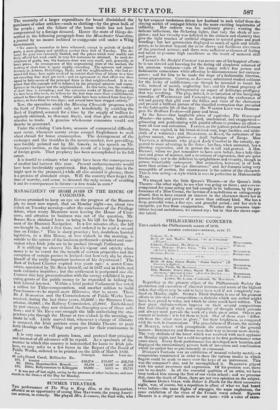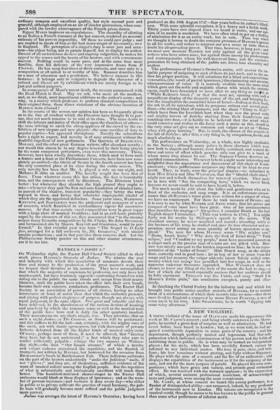EIGHTH CONCERT-3[0 . '01AI', JUNE 17.
ACT I.
F.:IA/Ilia, No. 3. SPOHR.
MEEwri, " Se nf ahlmudoui " tNitaeri) MERCAIIANTE. Pianoforte. Mr. MILER.
SCI.110, Mad tine Pouts G " En vain j'esr4e " (Rbert mirth!) Ev rtommt.
0% mute, Fi4eiit, BEETuovIEN.
ACT II.
Sinfonia, No, 4 BEETHOVEN. ed Aria, Signor :Amu°, " Swim funerea" ('r”ri, too in Egittn) MEYERDEER. ('uncorlo, 'Violin. Mr. 111.Amlov • MAVSEPER.
Trio, Madame Dotws GRAS, Signor MARIO, and Mr U,itjI.EI, • Quo Mat it to ire • ' tflobert Diliqe) MEYERBEER. Overture, Le llorine Pnln--1. A. BtOIDERO.
LOAM Mr. Loorm-Conattetor, MOSCHELES.
Begardieg as the primary object of the Philharmonic Society the production and execution of classical instrumental music of the 'highest order, that object may be said to have been well if not completely rea- lized on Monday night. SP011 ICS Third Sinfonia is one of his greatest efforts in this style of composition—a sinfimia which any author might have been proud to write, and which he alone could have written. The four great sinfhnia-writers impress on their several compositions that individuality of style and originality of thought which pervade and always must pervade the work of a truly great artist. Others are content to imitate ; it is for them to lead. One of these stars " differ- eth from the other stars in glory," but their brightness, as compared with the rest, is transcendant. The gracefidness of HAYDN, the melody of Mozawr, seized with promptitude the attention of' the general hearers : BEETHOVEN and Scotia won their way to favour more slowly. The very sinfonia of the latter which was received with such applause on Monday night, met but a cold reception at its first performance some years since. Every fresh performance has developed new beauties, and displayed the extraordinary powers both of invention and combination which its author has so preSmineutly at command. D6HLER'S Fantasia was an exhibition of manual velocity merely—a composition constructed in order to show the various modes in which fingers could be made to move over the keys of an instrument. This was the composer's aim, and he accomplished it. BLAGROVE played with his usual sweetness and expression. Of his position now, there can be no doubt. In all the essential qualities of an artist, we have long ranked him among the first of our violin school ; and we presume that, since the death of Mom, there are not two opinions on the subject. Madame Dones GaAs, with Robert le Diable for the third successive night, was, of course, but a repetition in effect of what we had heard twice before—the same flights of arpeggio, the same explosions, the same exhibition of the vices of the French vocal school. Signora MEsaers is a singer much more to our taste : with a voice of extra-
Ordinary compass and excellent quality, her style seemed pure and graceful, although employed on an air of slender pretensions, when com- pared with the tawdry extravagance of the French prima donna.
Signor Manm improves on acquaintance. The absurdity of allotting to an Italian a French romance at the last concert, rendered an accurate estimate of his powers impossible. Of these we could now judge ; and are enabled to speak of him as thC best tenor-singer of his country, now in' England. His perception of a singer's duty is most just and acen • rate—his object being, not to parade himself, but to display his author. Devoid of all meretricious devices and claptrap vulgarities, he makes his appeal to the senses and the hearts of his hearers, and with consummate success. Nothing could be more pure, and at the same time more forcible, than his delivery of the very impressive Scena from 11 Crucial°. He has sung four times at these concerts, and once only in a composition at all suited to or worthy of him. Rumour describes hint as a man of education and a gentleman. We believe rumour in this instance : it belongs only to vulgarity to degrade the character of a refined and liberal art by exhibitions which are utterly foreign to its just and noblest purposes. In consequence of MORI'S recent death, the concert commenced with the Dead March in Saul. May we ask, who made all the needless, and, as we think, most impertinent additions to the author's score ; and why, in a society which professes to perform classical compositions in their original form, these direct violations of the obvious intention of HANDEL were allowed ?
In the course of the season our opinion has been so frequently given as to the line of conduct which the Directors have thought fit to pur- sue, that not much remains to be said at its close. The same desire to shift the labours and duties of their office upon the shoulders of others— the same striving to catch the cheap applause of the crowd by the ex- hibition of new singers and new players—the same sacrifice of duty to popular caprice—has appeared throughout. Novelty the subscribers have a right to expect, and novelty is of' easy attainment without the doubtful expedient of new performers. The Quartets of BEErnovEs, Mozawr, and the other great German writers, offer abundant novelty ; !tor would this charm be in any degree lessened by their being played by the same competent performers, even were this necessary. These, however, have been wholly discarded; these, which used to form such a. feature and a feast at the Philharmonic Concerts, have been now com- pletely proscribed—the Otetto of Seonn in the fourth concert has been the only concerted piece of its class during the entire season. The only novelty has been that Mr. A. played a solo on one night, and Madame B. ditto on another. The novelty sought has been that of faces. From whatever cause this has arisen, the fact is lamentably true, and the consequences will be disastrous. The Directors know better : but whenever they abandon the high ground they ought to take—whenever they quit the firm and sure foundation of classical taste, in pursuit of the shadow, transient popularity—they betray the trust reposed in them, and betray that otherwise impregnable citadel of
which they are the appointed defenders. Some years since, HARRISON. KNYVETT, and BARTLEMAN were the projectors and managers of a set of concerts, which flourished in extraordinary vigour for successive
seasons. At that time certain vocal compositions were in great vogue with a large class of musical fwaddlers ; and in an evil hour, probably urged by the clamours of this set, they announced that "in the ensuing season many favourite compositions by Hr. Clarke, Sir John Stevenson,
and harmonized airs by Messrs. Knyvett and Oreatorex, would be per- formed." In that eventful year was born " The Sequel to 0 Latly fair, arranged for a full orchestra by, Mr. Greatorex," with similar erudite productions; and in that year also those concerts died. Let the
Philharmonic Society ponder on this and other similar occurrences, ere it be too late.



























 Previous page
Previous page